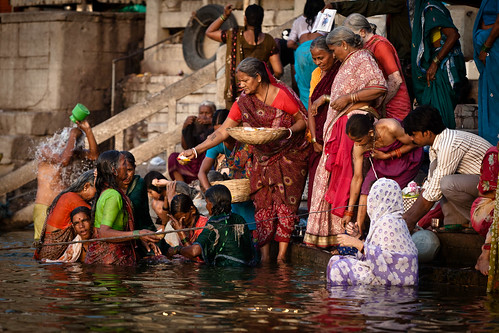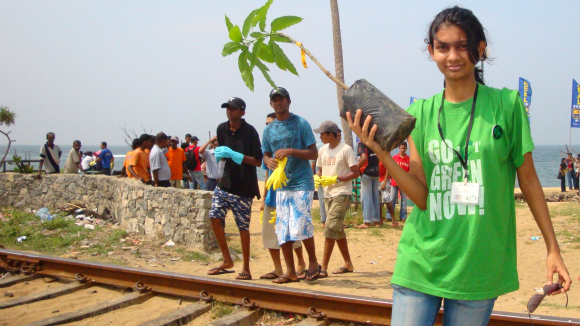Search Results for Tag: India
Cleaning up the Ganges
The holiest of India’s rivers, the Ganges, is also among the world’s dirtiest. The 2,500-kilometer (1,500-mile) Ganges in India is choking under industrial effluents, farm pesticides and other untreated sewage. Several attempts to clean up the river have failed in the past.
Now, the Britain-based Thames River Restoration Trust is starting a new initiative. It plans to work with communities living along the river to restore ponds to treat waste water. Villagers will be helped to adopt eco-friendly agriculture and encouraged to save some of the world’s rarest freshwater wildlife such as the Ganges river turtle, the Ganges river dolphin and the critically-endangered Gharial crocodile.
As part of the project, scientists from India will visit Britain to learn how the trust helped restore the River Thames, from almost biologically dead in the 1950s to one of the cleanest urban rivers in the world.
Green Ganeshas
Ganesha Chaturthi is a major Hindu festival in India. The highlight is the immersion of thousands of idols of the elephant-headed god Ganesha in lakes and rivers. Environmentalists however say the brightly-colored statues contain toxic chemicals which cause serious pollution to water bodies.
Now, authorities in the state of Andhra Pradesh have launched a campaign ahead of this year’s festival in September for eco-friendly Ganeshas. They’re pushing for the use of statues made of clay instead of the usual plaster of Paris. Clay, they say, dissolves quickly and does not harm aquatic life. Idol-makers are being trained to use natural colors instead of chemicals for painting the statues. The campaign also urges people to remove plastics and other decorations put on the idols before they are immersed in the water.
Sunshine in a pot – Solar cooking in India
Hundreds of children attend the schools of the Muni Seva Ashram in the Western Indian state of Gujarat everyday. Their school meals used to be prepared over wood fires. Now a new project harnesses the power of the sun for the school canteen. In our first gallery on our blog we are taking you back to one of our first reports for GLOBAL IDEAS. We hope that you enjoy these pictures.
Indian Companies Win “Green Oscars”

Two Indian companies have been awarded the prestigious International Ashden Awards for Sustainable Energy – considered the “green oscars.” Husk Power Systems and Abellon CleanEnergy Ltd were honored for their innovative clean energy solutions that have made a lasting impact in India.
Husk Power Systems has made its mark by producing energy out of rice husks. There are about 60 gasification plants (pictured above) that generate electricity for more than 25,000 households in the state of Bihar. Abellon makes more than 65,000 tons of biomass pellets every year that are used to power industry in the state of Gujarat – and the pellets also provide an outlet for farm waste, too.
Both companies have proven that local clean-energy infrastructure can be an effective way to combat climate change. Congrats!
Anoka Primrose Abeyrathne, Climate Champion from Sri Lanka
Anoka Primrose Abeyrathne has been an eco-activist for 14 years. She was nominated as a Climate Champion and Global Changemaker by the British Council. Anoka is also an AshokaYouth Venturer for Social Entrepreneurship. For the GLOBAL IDEAS Blog she will be writing about her work as a Climate Champion and her experiences with climate change.
Part I
People my age like to have fun. That is why the initiative we set up, is a “fun + action” initiative. Within the Sri Lanka Youth Climate Action Network (SLYCAN), we organize debates at university level, beach parties, replantation or clean-up campaigns, interactive workshops, discussion platforms, art exhibitions and and street theatre plays. All of these activities are popular with children and young people. They are the catalysts of change in the society, in becoming eco-responsible adults.
As a volunteer for the NGO EMACE Sri Lanka, I work with the communities of Bolgoda Lake in Sri Lanka on a grass roots level. This way we are creating a win-win situation. On the one hand we save the mangroves in the region. On the other hand we help the villagers by promoting eco-tourism or solar fishing lamps. We help to develop sustainable fishing techniques and we are looking for customers for the handmade and eco-friendly products of the people. A programme to train eco-tourism guides, handicraft methods and sustainable fishing is ongoing. All of these projects will be expanded at national level, collaborating with branches of EMACE and SLYCAN islandwide.
My work enabled me to be the SAARC Youth Award Recipient 2010, for Outstanding Contribution to the Protection of the Environment and Mitigation of Climate Change.
These may be small steps but the impact is growing and creating a wave of eco-positive change among youth in Sri Lanka.














Feedback